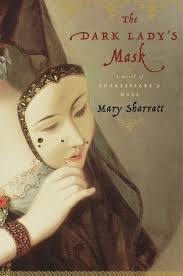 It is a brave writer that sets out to tackle anything about William Shakespeare and how he wrote his plays. Even more so when the author posits the idea that Shakespeare relied on a female poet as his collaborator. I dare say the novel will have its detractors, particularly those who find the portrait of Shakespeare doesn’t live up to their expectations of him as a romantic hero. But this is a superb novel that immerses the reader firmly into the seamy world of the Elizabethan Court, viewed through the eyes of court musicians and courtesans, and then into the olive groves and vineyards of Renaissance Verona.
It is a brave writer that sets out to tackle anything about William Shakespeare and how he wrote his plays. Even more so when the author posits the idea that Shakespeare relied on a female poet as his collaborator. I dare say the novel will have its detractors, particularly those who find the portrait of Shakespeare doesn’t live up to their expectations of him as a romantic hero. But this is a superb novel that immerses the reader firmly into the seamy world of the Elizabethan Court, viewed through the eyes of court musicians and courtesans, and then into the olive groves and vineyards of Renaissance Verona.
Aemilia Bassano Lanier, the Dark Lady of the book’s title, is a strong and engaging protagonist. Well-educated, musical, and with an ear for poetry ‘that intoxicated her like wine’ she teams up with the not-yet-famous Shakespeare to bring sparkle to his plays. A long sojourn in Italy consolidates their romantic relationship, where together they write some of the most well-known of his plays, such as Twelfth Night. The relationship is filled with artistic and sexual tension, and undercurrents of themes which appear in the plays. The idea of turning Aemilia into a Viola – a cross-dressing disguise – works very well in this Elizabethan context. Mary Sharratt has incorporated many references to Shakespeare’s plays, and these add enjoyment to the narrative as the reader spots the allusion. The passionate liaison between Aemilia and Will lasts until Will hears of the death of his son, when, filled with guilt, he decides to return to his wife.
After this episode the book becomes more Aemilia’s own, and we come to appreciate what a remarkable talent she had, and how hard it was for a female poet to find an audience in those times. Filled with extracts of Lanier’s own poetry, which is seamlessly integrated into the narrative, this is a literary tour de force. Aemilia’s situation forces us to examine what role women had (and have) in the role of poetry as a means of expressing deeper engagement with the human condition, and how religious views about woman’s ‘fall from grace’ affected Lanier’s life, and by reflection, female poets of today. Anyone interested in the cultural climate of Elizabethan England will find much to engage them, and I learnt a lot about both Shakespeare and about Aemilia Lanier from this novel. Highly recommended.
